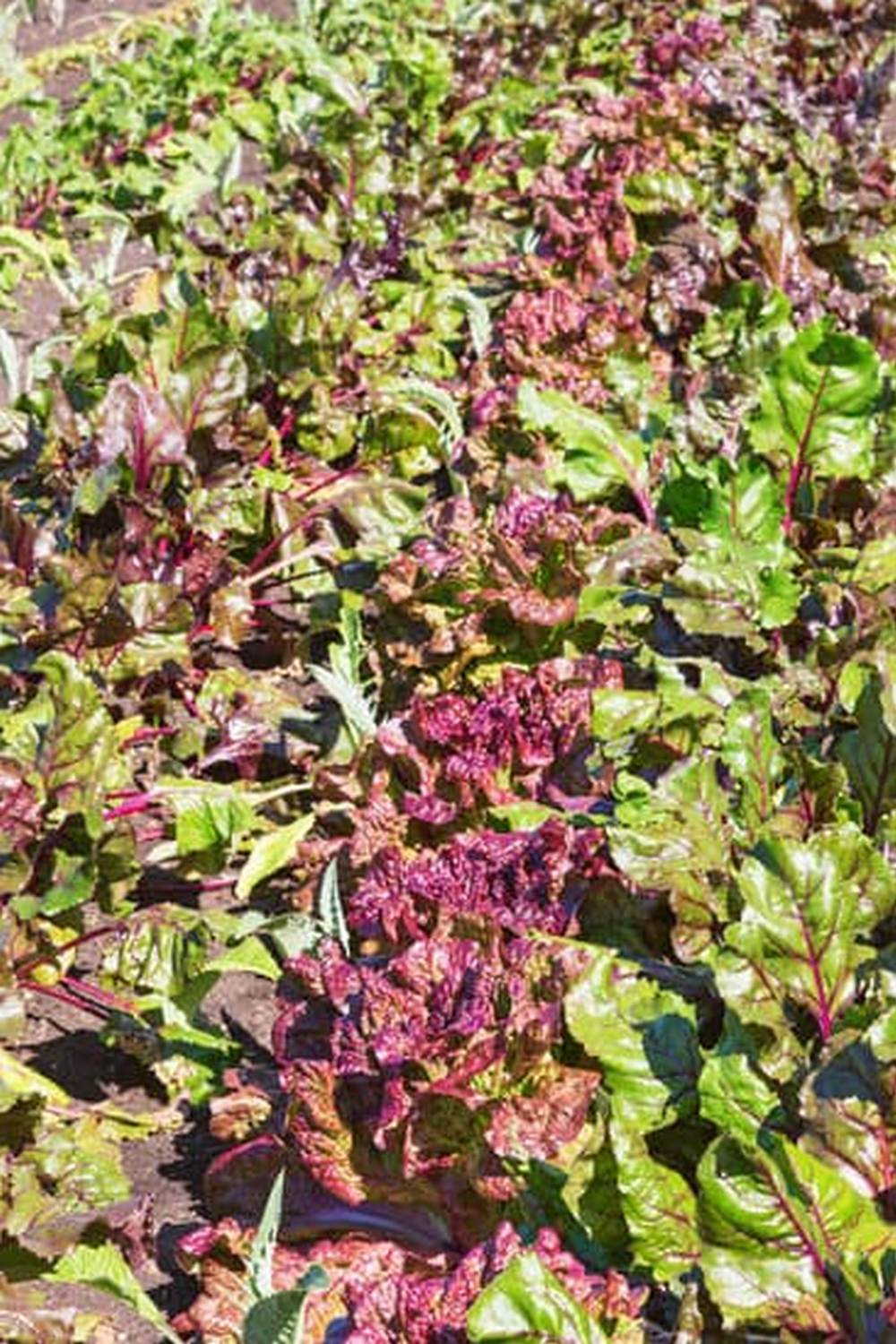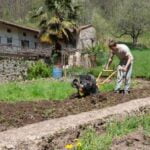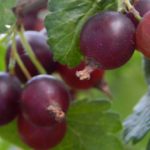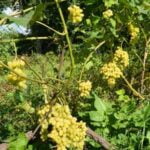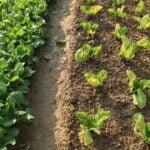With the growing popularity of vegetable gardens, many individuals are looking for safe products to maintain and protect their flourishing plants. One common question that arises is whether Thompson Water Seal is safe to use in vegetable gardens. In this blog post, we will delve into the topic and explore the potential risks and concerns associated with using Thompson Water Seal in your vegetable garden.
Vegetable gardens have become a popular way for individuals to enjoy fresh, homegrown produce while also promoting sustainability and self-sufficiency. However, it is crucial to consider the safety of the products we use in these gardens. This brings us to the question at hand: Is Thompson Water Seal safe for vegetable gardens?
Thompson Water Seal is a widely known protective sealant used on various surfaces, including wood. It functions by creating a barrier against moisture and preserving the integrity of the surface it is applied to. While it may be effective in safeguarding outdoor furniture or decks, there are concerns about its compatibility with edible plants.
In the following sections of this blog post, we will explore Thompson Water Seal’s composition and how it works as a sealant. We will also examine the potential risks associated with its use in vegetable gardens and assess whether it meets regulations and safety standards for gardening products.
Additionally, we will explore alternative options that may be considered safer for sealing vegetable gardens and provide insights from gardening experts to help you make an informed decision regarding the use of Thompson Water Seal in your own garden.
Understanding Thompson Water Seal
Thompson Water Seal is a popular choice for sealants in various applications, including outdoor surfaces and structures. Before determining whether or not it is safe for use in vegetable gardens, it is essential to understand what Thompson Water Seal is and how it functions as a protective sealant.
What is Thompson Water Seal?
Thompson Water Seal is a transparent waterproofing product that helps protect wood, concrete, and other porous surfaces from water damage. It works by penetrating the material, creating a barrier that repels water and prevents moisture from seeping in. This can be particularly useful for outdoor structures like fences, decks, and raised beds commonly found in vegetable gardens.
Composition of Thompson Water Seal
Thompson Water Seal consists primarily of two key components: paraffin wax and silane/siloxane compounds. Paraffin wax gives the product its characteristic transparency and enhances its waterproofing capabilities. Silanes and siloxanes are chemical compounds that help create a water-repellent barrier when applied to porous materials.
The combination of these components allows Thompson Water Seal to effectively protect wood and other surfaces from not only water but also harmful effects caused by UV rays from the sun. By preventing moisture intrusion, this sealant can prolong the lifespan of garden structures while maintaining their appearance.
It’s important to note that while Thompson Water Seal has been widely used for decades, there have been concerns raised regarding its safety when used in vegetable gardens. These concerns mainly stem from the chemicals present in the product and their potential risks to human health or plant growth. In the following section, we will delve deeper into these safety concerns associated with using Thompson Water Seal in vegetable gardens, exploring both regulations and research conducted on this topic.
Potential Risks
One of the primary concerns raised by individuals regarding the use of Thompson Water Seal in vegetable gardens is the potential risks associated with the chemicals used in the product. Thompson Water Seal contains a mixture of chemicals, including paraffin wax, mineral spirits, and water repellents. While these ingredients are effective at providing a protective sealant for various surfaces, questions arise about their safety when it comes to edible plants.
The main issue lies in the fact that some of these chemicals are not intended for direct contact with food or consumption. Paraffin wax, for example, can be harmful if ingested in large quantities and may cause digestive issues. Additionally, certain water repellent chemicals used in Thompson Water Seal have been found to be toxic to aquatic life and can have harming effects on soil organisms.
It is vital to consider these potential risks before using Thompson Water Seal in your vegetable garden. While there may not be conclusive evidence about its direct impact on human health or vegetable growth, taking precautions and exploring safer alternatives might be a wise decision.
Regulations and Safety Standards for Gardening Products
Thompson Water Seal is a popular product used for sealing various outdoor surfaces, including decks, fences, and even vegetable gardens. However, before using it in your garden, it’s important to understand the regulations and safety standards that exist for gardening products.
When it comes to gardening products, there are specific regulations and safety standards in place to ensure the protection of consumers and the environment. These regulations vary depending on the country or region, but they generally focus on the use of certain chemicals and their potential impact.
In the United States, for example, gardening products fall under the regulation of the Environmental Protection Agency (EPA). The EPA sets guidelines regarding which chemicals can be used in these products and at what concentration levels. They also require manufacturers to provide clear instructions for safe use and disposal.
So where does Thompson Water Seal stand when it comes to these regulations and safety standards? The product has been approved by regulatory authorities for outdoor use, including on surfaces such as fences and decks. However, it’s important to note that Thompson Water Seal has not specifically been tested or approved for use on edible plants or vegetables.
While Thompson Water Seal may meet general safety standards for outdoor use, there is no specific information available about its impact on edible plants. Therefore, caution should be exercised when considering its application in vegetable gardens. It is recommended to explore alternative sealants or methods that have been specifically approved for use around edible plants. This ensures that you are adhering to the highest safety standards and protecting both your plants and yourself from potential risks.
By being aware of the regulations and safety standards set for gardening products and understanding how they apply to Thompson Water Seal, you can make an informed decision about its suitability for your vegetable garden. Remember, always prioritize the health and well-being of your plants when choosing any type of product or treatment method in your garden.
Assessing the Impact on Vegetables and Edible Plants
One of the primary concerns when considering the use of Thompson Water Seal in vegetable gardens is the potential impact it may have on the safety and quality of the produce. While there may be benefits to using a protective sealant in order to extend the lifespan of garden structures or prevent rotting, it is crucial to understand any potential negative effects or risks that may arise from its application.
Several studies and research have been conducted to assess the impact of Thompson Water Seal on vegetables and edible plants. While there is limited information specifically focused on this product, studies examining similar wood sealants provide some insights.
These studies suggest that when used properly and according to instructions, Thompson Water Seal does not pose significant risks to vegetables or edible plants. However, it is important to note that improper application or excessive use of the sealant could potentially lead to chemical residue buildup on plant surfaces.
When applying Thompson Water Seal in a vegetable garden, it is crucial to follow guidelines and best practices. It is recommended to apply the sealant during periods where vegetable growth has temporarily ceased, such as during winter months or prior to planting new crops.
This ensures that any potential contact between vegetables and the sealant is minimized. Additionally, it’s important to only apply the product on non-edible surfaces such as wooden structures or raised beds, avoiding direct contact with leaves, stems, or edible portions of plants.
By taking these precautions into consideration and adhering strictly to usage guidelines, gardeners can minimize any potential negative impact on their vegetables and ensure their safety for consumption. However, individuals who are particularly concerned about using a synthetic sealant like Thompson Water Seal in their vegetable gardens may want to explore alternative options that are considered safer for food-producing areas.
Tips for Safe Application and Usage
Thompson Water Seal is a widely popular product used for sealing various outdoor surfaces, including decks, fences, and even vegetable gardens. However, when it comes to using this sealant in vegetable gardens, it is essential to consider safety precautions and best practices to ensure the well-being of both the plants and individuals handling the product. In this section, we will provide some tips for safe application and usage of Thompson Water Seal in vegetable gardens.
- Choose the right time: It is important to apply Thompson Water Seal when weather conditions are suitable. Avoid applying it during rainy or windy days as it may lead to uneven application or runoff, causing potential harm to nearby plants.
- Read and follow instructions: Before using Thompson Water Seal, carefully read the product label and follow the instructions provided by the manufacturer. Different products may have specific guidelines regarding application methods, drying times, and safety precautions. Following these instructions will help ensure proper usage and minimize any potential risks.
- Use protective gear: When applying Thompson Water Seal, protect yourself by wearing appropriate clothing and safety gear such as gloves, long sleeves, goggles, and a mask. These precautions are particularly important when working with any chemical-based product to prevent skin irritation or inhalation of fumes.
- Apply in designated areas: Ensure that you only use Thompson Water Seal on surfaces where direct contact with edible plants is unlikely. Focus on sealing structures like raised beds or wooden supports rather than applying directly onto plant leaves or stems.
- Allow sufficient drying time: After applying Thompson Water Seal, allow adequate drying time as recommended by the manufacturer before allowing children or pets near treated areas. This will help minimize any potential contact with the sealant while it is still wet or releasing volatile substances.
By following these tips for safe application and usage of Thompson Water Seal in vegetable gardens, you can protect both your plants and yourself from unnecessary risks. Remember that moderation is key – use the sealant sparingly and only on non-edible structures to prioritize the safety of your vegetable garden.
Alternative Options
When considering sealing your vegetable garden, it is important to explore alternative options that are safe for both the plants and individuals. While Thompson Water Seal may be a popular choice for sealing purposes, there are several other safer alternatives available. These alternatives provide effective protection for your vegetable garden without introducing potential risks from harmful chemicals.
One of the safest and most commonly recommended alternatives is a food-grade sealant or wax. These products are specifically designed to be used on edible plants and do not contain any harmful chemicals that could pose a risk to human health or the environment. Food-grade sealants and waxes create a protective barrier on the leaves of plants, preventing moisture loss and reducing the risk of disease or pest infestation.
Another option to consider is natural oil-based sealants. These sealants are made from natural ingredients such as linseed oil or beeswax and are readily available at gardening stores or online retailers. Natural oil-based sealants provide an effective barrier against water and can help prevent damage caused by harsh weather conditions. They do not introduce any harmful chemicals into your vegetable garden and are safe for both plants and humans.
Alternatively, some gardeners choose to use homemade remedies for sealing their vegetable gardens. One popular method is creating a mixture of melted beeswax, coconut oil, and neem oil. This DIY sealant provides a protective layer while also offering natural insect-repellent properties. However, it is important to note that homemade remedies may not have undergone rigorous testing like commercial products, so it is advisable to conduct further research or seek advice from gardening experts before using them.
| Alternative Option | Benefits | Potential Drawbacks |
|---|---|---|
| Food-grade sealant/wax | Safe for edible plants, forms a protective barrier, reduces risk of disease/pests | May need frequent reapplication, may not be as long-lasting as chemical sealants |
| Natural oil-based sealant | Made from natural ingredients, effective water barrier, safe for plants and humans | May require more frequent application, effectiveness can vary based on climate conditions |
| Homemade sealant (beeswax, coconut oil, neem oil) | Natural and insect-repellent properties | Lack of rigorous testing, effectiveness may vary depending on ingredients/measurements used |
When deciding which alternative option to use for sealing your vegetable garden, it is important to consider factors such as personal preference, ease of application, and specific needs of your plants. Remember to always read product labels carefully and follow instructions for safe application.
Consulting with gardening experts or seeking advice from local agricultural extension offices can also offer valuable insights and recommendations. By choosing a safer alternative option for sealing your vegetable garden, you can ensure the health and well-being of both your plants and yourself.
Expert Opinions
Understanding the Importance of Expert Opinions
When considering the safety of using Thompson Water Seal in vegetable gardens, it is important to seek insights from gardening and environmental experts. These professionals possess extensive knowledge and experience in the field and can provide valuable perspectives on potential risks and alternative options. Their opinions can help individuals make informed decisions about whether or not to use Thompson Water Seal in their vegetable gardens.
Perspectives from Gardening Experts
Gardening experts weigh in on the topic of using Thompson Water Seal in vegetable gardens with varying opinions. Some experts argue that while Thompson Water Seal is generally safe for outdoor applications, it may not be suitable for edible plants due to its chemical composition.
They emphasize that caution should be exercised when considering its use near vegetables as it could potentially contaminate the soil and affect the overall health of the plants. These experts suggest exploring alternative sealing options that are specifically designed for safe use in vegetable gardens.
On the other hand, there are gardening experts who believe that if Thompson Water Seal is applied correctly and allowed ample time to dry before planting, it should pose minimal risk to edible plants. They highlight that as long as users follow proper application guidelines and take proper precautions, such as directing overspray away from vegetation or applying a sufficient number of coats, Thompson Water Seal can offer effective protection against moisture damage without negatively impacting vegetables.
Insights from Environmental Experts
Environmental experts approach the question of using Thompson Water Seal in vegetable gardens from an ecological standpoint. Many argue that given its chemical composition, which includes volatile organic compounds (VOCs), solvents, and petroleum distillates, Thompson Water Seal can potentially leach harmful substances into the environment. This leaching process may occur slowly over time due to rain or irrigation water seeping into the soil.
These environmental experts recommend opting for more environmentally friendly sealant alternatives that do not contain harmful chemicals or VOCs. They stress the importance of considering the long-term impact on the soil, water sources, and overall ecosystem health. By using safer alternatives or employing natural gardening methods that promote soil health and moisture retention, individuals can contribute to a more sustainable and eco-friendly vegetable garden.
Overall, it is crucial to consult both gardening and environmental experts when deciding whether Thompson Water Seal is safe for vegetable gardens. Their insights can provide a well-rounded perspective on potential risks, alternative options, and overarching considerations for maintaining a healthy and safe environment for edible plants.
Conclusion
After exploring the composition of Thompson Water Seal and examining the potential risks associated with its use in vegetable gardens, it is important for individuals to make an informed decision about whether or not to use this product. While Thompson Water Seal may provide an effective protective sealant for various purposes, it is crucial to consider the impact it may have on vegetables and edible plants.
Regulations and safety standards exist for gardening products, but it is essential to research and ensure that Thompson Water Seal meets these standards before using it in a vegetable garden. Additionally, conducting further studies or research on the specific impact of Thompson Water Seal on vegetables can provide valuable insights into any potential negative effects or risks that should be considered.
It is also recommended to follow guidelines and best practices when applying and using Thompson Water Seal in garden-beds-for-vegetables/” target=”_blank” rel=”follow noopener”>vegetable gardens. This includes reading the instructions carefully, wearing protective gear, and avoiding direct contact between the product and edible parts of the plants. As an alternative, there are safer options available for sealing vegetable gardens that could be explored.
Ultimately, making an informed decision about whether or not to use Thompson Water Seal in vegetable gardens requires weighing the potential benefits against the potential risks. Considerations should include personal preferences, local regulations, expert opinions, and available alternatives. By taking all these factors into account, individuals can ensure the safety of their plants as well as their own well-being while maintaining a thriving vegetable garden.
Frequently Asked Questions
Is Thompson water Seal safe for raised garden beds?
Thompson Water Seal is not recommended for use on raised garden beds. While it is an effective sealant for wood, it is primarily designed for outdoor application on decks, fences, and other structures.
When used on raised garden beds, there is a possibility that the chemicals in Thompson Water Seal can leach into the soil and potentially contaminate the plants or vegetables grown in the bed. It is important to prioritize the safety of your edible plants by using a sealant specifically labeled as safe for garden use.
Is wood sealer safe for vegetable garden?
Wood sealer can be safe for a vegetable garden if you choose the right product. Look for a wood sealer that is specifically labeled as food-safe or safe for use around edible plants.
These sealers are typically made from natural ingredients such as plant oils or beeswax, which pose no risk of chemical leaching into the soil or contaminating your vegetables. It’s always important to read the product label and follow any safety instructions provided by the manufacturer to ensure that the wood sealer you select is appropriate for use in a vegetable garden.
Is water based stain safe for vegetable gardens?
Generally speaking, water-based stains are considered safer than solvent-based stains when it comes to vegetable gardens. Water-based stains have lower levels of volatile organic compounds (VOCs) compared to solvent-based products, which means they release fewer harmful fumes into the air during application and drying. However, it’s crucial to choose a water-based stain specifically formulated for use in vegetable gardens or on surfaces that will come into contact with edible plants.
This ensures that any potential contaminants in the stain are minimal and safe for consumption when absorbed by your vegetables. Always check product labels or consult with professionals at your local gardening center to ensure you’re selecting a water-based stain suitable for your particular needs.

If you’re looking to get into vegetable gardening, or are just looking for some tips on how to make your current garden better, then you’ve come to the right place! My name is Ethel and I have been gardening for years. In this blog, I’m going to share with you some of my best tips on how to create a successful vegetable garden.

